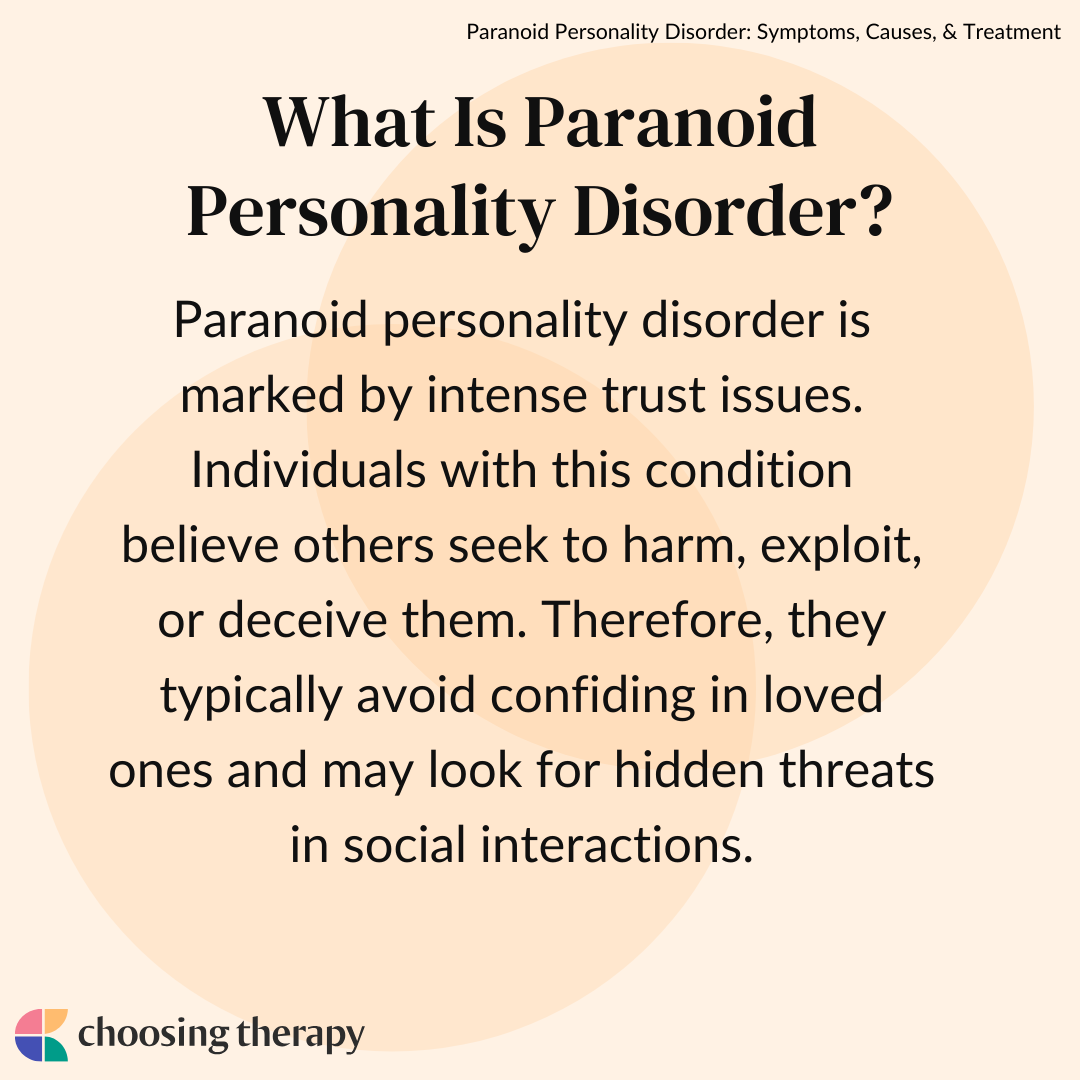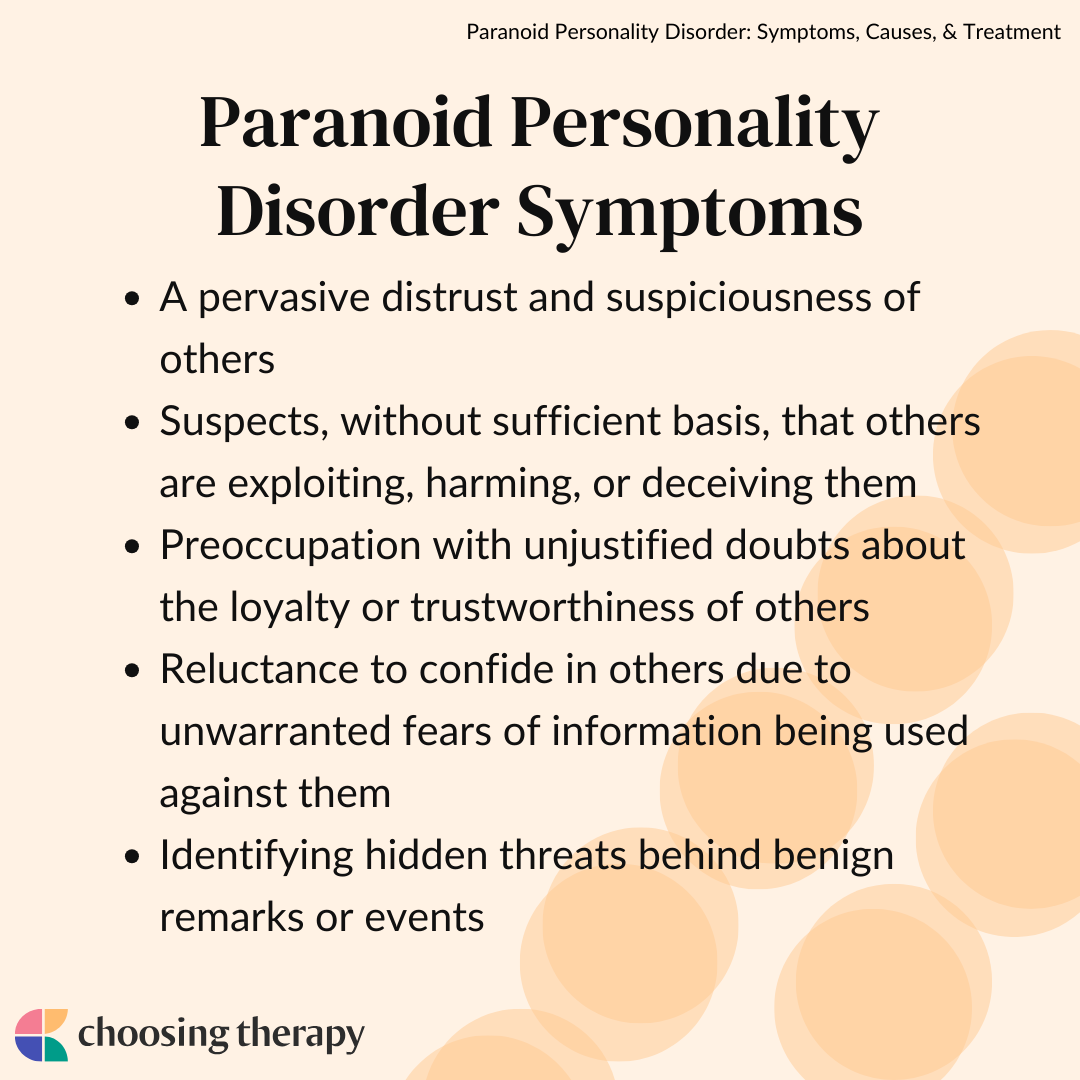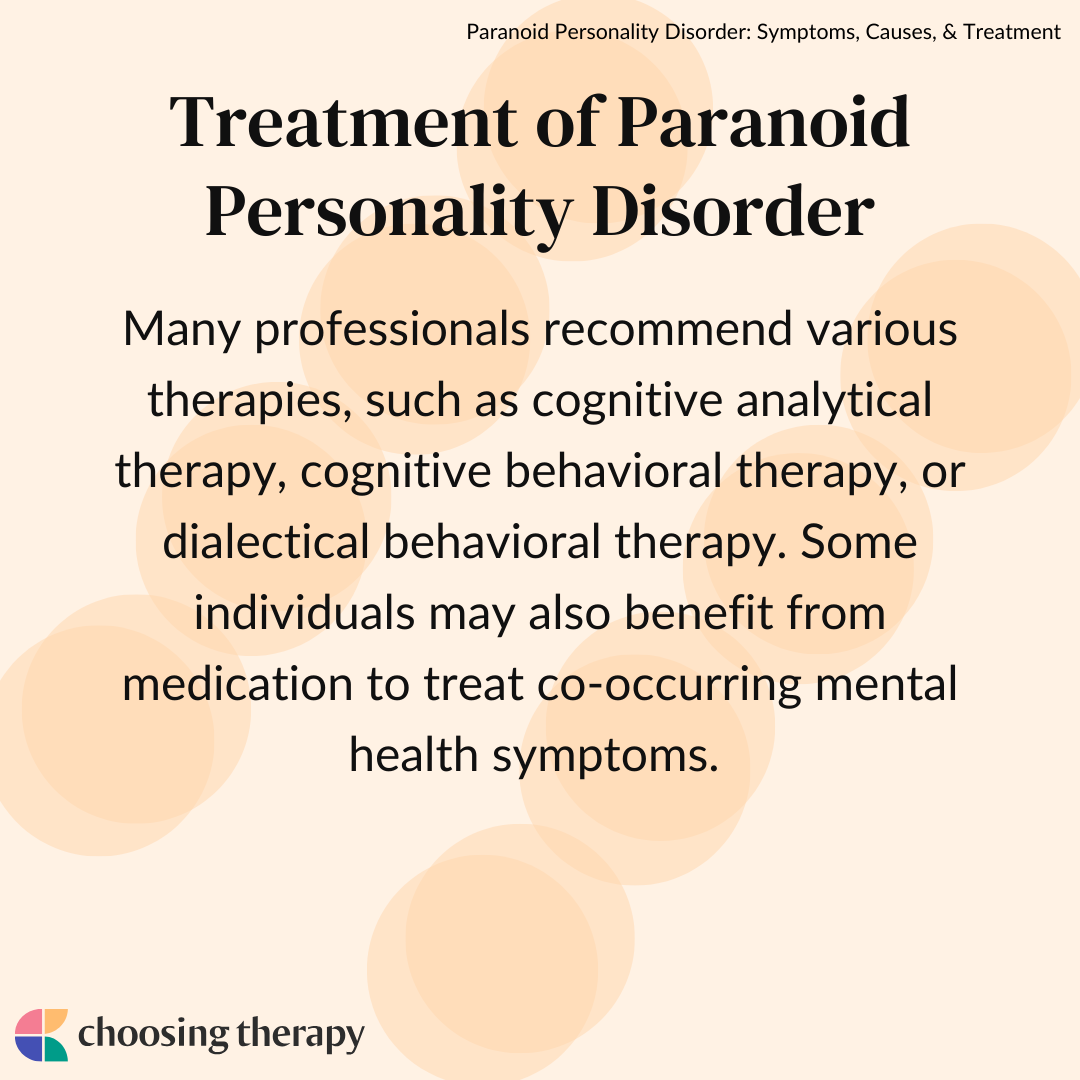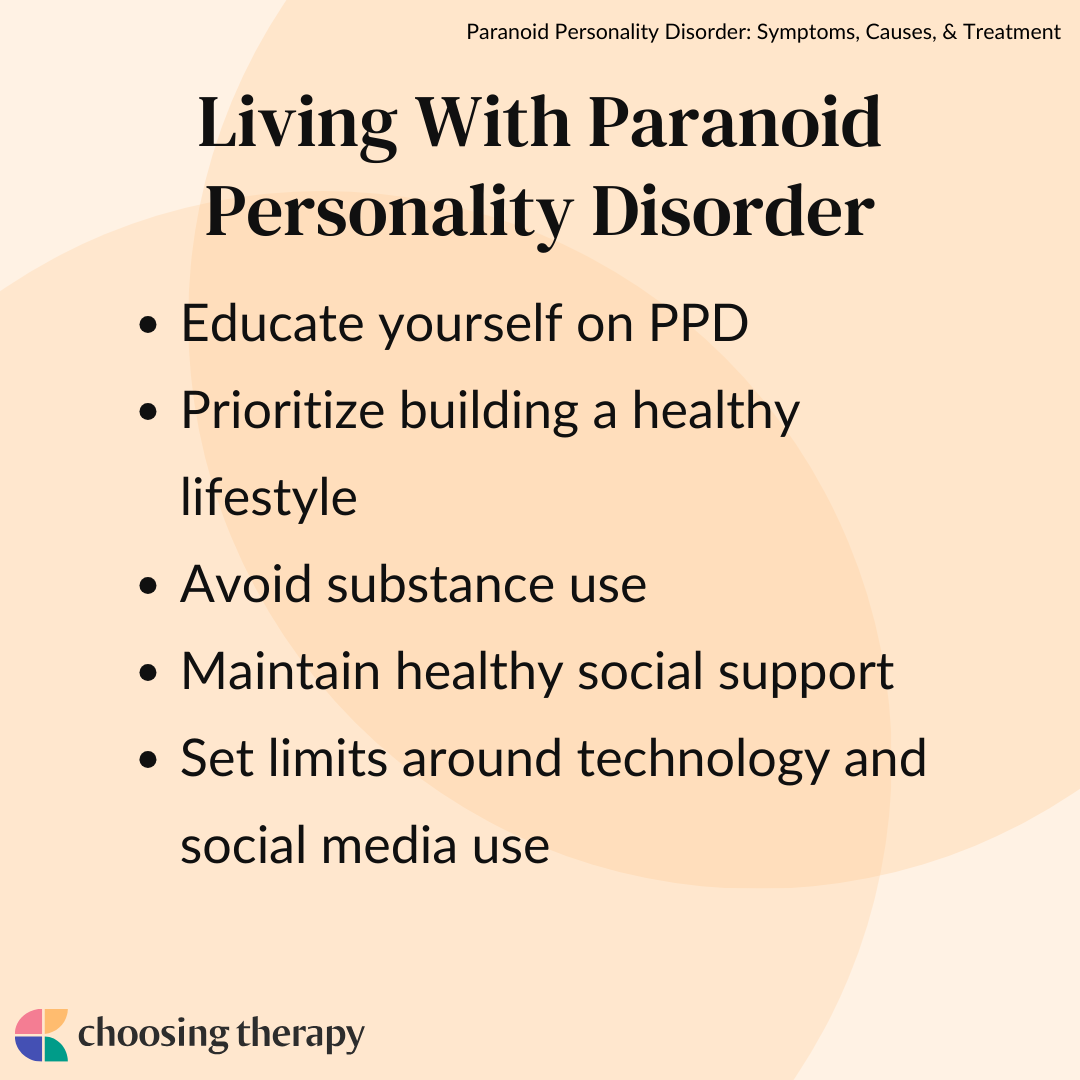Paranoid personality disorder is a mental health condition resulting in persistent patterns of distrust and suspicion. Individuals with paranoid personality disorder typically experience severe relationship problems due to a reluctance to confide in others and a tendency to hold grudges. Treatment may help address these challenges by replacing negative thoughts and beliefs.
Find a therapist who specializes in personality disorders. BetterHelp has over 20,000 licensed therapists who provide convenient and affordable online therapy. BetterHelp starts at $65 per week. Take a Free Online Assessment and get matched with the right therapist for you.
What Is Paranoid Personality Disorder?
Paranoid personality disorder is a cluster A personality disorder marked by intense trust issues. Individuals with this condition believe others seek to harm, exploit, or deceive them. Therefore, they typically avoid confiding in loved ones and may look for hidden threats in social interactions.1 Some can become hostile and volatile when criticized, often holding grudges indefinitely.
Paranoid Personality Disorder Symptoms
The main symptoms of paranoid personality disorder include distrust and suspiciousness around others. These fears lead to subsequent paranoid behavior, such as withdrawing from others, holding grudges, or consistently doubting intentions. The signs of paranoid personality disorder can emerge throughout life and are often comorbid with other mental health issues.2
Symptoms of paranoid personality disorder include:3
- A pervasive distrust and suspiciousness of others
- Suspects, without sufficient basis, that others are exploiting, harming, or deceiving them
- Preoccupation with unjustified doubts about the loyalty or trustworthiness of others
- Reluctance to confide in others due to unwarranted fears of information being used against them
- Identifying hidden threats behind benign remarks or events
- Persistently bearing grudges (i.e., is unforgiving of insults, injuries, or slights)
- Perceiving attacks on character or reputation not apparent to others
- Recurrent suspicions, without justification, regarding fidelity of spouse or sexual partner
What Causes Paranoid Personality Disorder?
What causes paranoid personality disorder is unknown, but research suggests interacting genetic traits and environmental influences likely affect development. Additional risk factors of paranoid personality disorder may include adverse childhood experiences, being raised by neglectful caregivers, and comorbid mental health conditions.
Possible paranoid personality disorder causes include:2
- Adverse childhood experiences: Personality disorders and trauma are highly comorbid. Cumulative traumatic events may increase susceptibility to developing PPD.
- Abuse: Abuse can naturally impact how people trust others (particularly individuals who are supposed to love them), which can later manifest as paranoid traits.
- Uninvolved parents: Uninvolved parents are often neglectful, sometimes leading their children to develop a longstanding mistrust toward authority figures or people in general.
- Genetic factors: Paranoid traits may run in families, and someone with PPD is likely to have a first-degree relative with this condition.
- Co-occurring conditions: Research shows that 48% of people with PPD have comorbid avoidant or BPD. Many others meet the criteria for NPD, substance use disorders, and panic disorder.
How Is Paranoid Personality Disorder Diagnosed?
A mental health professional can diagnose paranoid personality disorder using specific DSM-5 criteria. They will also conduct a thorough mental status exam and biopsychosocial assessment to rule out other potential mental health issues. They may refer the individual for psychological testing or other physical exams if there is a concern about neurological problems.
Complications of Paranoid Personality Disorder
PPD can significantly impair functioning. Individuals may face relationship challenges because they struggle to trust others and feel safe. They may find maintaining employment difficult or experience low self-esteem and physical health issues due to chronic stress.
Top Rated Online Therapy Services BetterHelp – Best Overall “BetterHelp is an online therapy platform that quickly connects you with a licensed counselor or therapist and earned 4 out of 5 stars.” Visit BetterHelp Online-Therapy.com – Great Alternative In addition to therapy, all Online-Therapy subscriptions include a self-guided CBT course. Visit Online-Therapy.com
Treatment of Paranoid Personality Disorder
Paranoid personality disorder treatment varies from person to person. However, many professionals recommend various therapies, such as cognitive analytical therapy, cognitive behavioral therapy, or dialectical behavioral therapy. Some individuals may also benefit from medication to treat co-occurring mental health symptoms.
Therapy Options
Therapy for paranoid personality disorder can help individuals target and replace unhealthy thought and belief patterns impacting their ability to function in daily life and relationships. Families or couples struggling with the complications of paranoid personality disorder can benefit from marriage or family-based counseling.
While many individuals with paranoid personality disorder do not seek treatment, help is available when ready. Finding the right therapist is essential to receiving effective treatment, and you can start your search on an online therapist directory.
Therapies for paranoid personality disorder may include:
- Cognitive analytical therapy: Cognitive analytical therapy involves reformulation, recognition, and revision. The client and therapist produce a narrative statement detailing the target problems. They then plan for “exits” to avoid repeating problem states.
- Cognitive behavioral therapy (CBT): Cognitive behavioral therapy (CBT) demonstrates the influence of events, thoughts, emotions, and body sensations on behaviors. Individuals can modify and change negative thoughts associated with negative consequences to promote positive outcomes.
- Dialectical behavior therapy (DBT): Dialectical behavior therapy (DBT) targets behaviors that need to change and provides skill building to facilitate healthy alternatives. DBT skills training focuses on mindfulness, emotion regulation, interpersonal effectiveness, and distress tolerance to improve the lives of individuals with personality disorders.
- Family therapy: In some cases, family therapy may be helpful for those living with a PPD family member. Everyone will learn more about the condition, presenting symptoms, and how they can be supportive without enabling problematic patterns.
- Couples counseling: Couples counseling can also be helpful if one or both partners have paranoid personality disorder. This type of therapy focuses on strengthening relationships and improving emotional intimacy.
- Group therapy: Group therapy can benefit people with personality disorders and other co-occurring mental health problems. Members offer feedback, psychoeducation, and specific interventions to reduce unwanted symptoms.
Medication
The FDA has not approved specific medications for paranoid personality disorder, but off-label antidepressants can help improve symptoms or co-occurring disorders.1, 2
Medication alongside therapy can benefit those struggling with emotional dysregulation, anxiety, anger, depression, self-injury, and suicidality.1 A psychiatrist or psychiatric nurse practitioner can work with the individual to diagnose and prescribe according to their needs.
Living With Paranoid Personality Disorder
Living with paranoid personality disorder can be tiring, upsetting, and lonely. You may feel angry when others do not understand your experience or embarrassed when you cannot discern paranoid thoughts from reality. You are not alone, and learning to improve your quality of life is possible.
Below are ways to cope with paranoid personality disorder:
- Educate yourself on PPD: Seek out information about this condition, your symptoms, and treatment options. This knowledge can help you develop neutrality about your experience.
- Prioritize building a healthy lifestyle: Taking care of your physical self may help you feel more emotionally stable, which can reduce paranoid thoughts.
- Avoid substance use: Substances may exacerbate paranoia, so consider cutting back or eliminating them altogether.
- Maintain healthy social support: Work on building healthy connections, even if you want to isolate from others. Start small and focus on quality over quantity.
- Set limits around technology: Doomscrolling or consuming excessive media can aggravate paranoia, so consider setting time limits.
Final Thoughts
Paranoid personality disorder is often misunderstood, stigmatized, and misdiagnosed. Living with this condition can undoubtedly be lonely and confusing for the person (and their loved ones). However, you can learn to take control of your symptoms and take care of yourself. Doing so may dramatically reduce the amount of stress you feel.
To help our readers take the next step in their mental health journey, Choosing Therapy has partnered with leaders in mental health and wellness. Choosing Therapy is compensated for marketing by the companies included below Talk Therapy Online-Therapy.com – Get support and guidance from a licensed therapist. Online-Therapy.com provides 45 minute weekly video sessions and unlimited text messaging with your therapist for only $64/week. Get started Psychiatry, with you in mind Talkiatry – Our Psychiatrists Can Diagnose Your Condition, Prescribe Medication, And Monitor Your Progress. Most psychiatry visits cost patients $30 or less* Free Assessment Starting Therapy Newsletter A free newsletter for those interested in learning about therapy and how to get the most benefits out of therapy. Get helpful tips and the latest information. Sign Up DBT Skills Course Jones Mindful Living Dialectical Behavior Therapy (DBT) is a popular treatment for BPD. Learn DBT skills with live weekly classes and online video courses for only $19 per month. Free One Week Trial Choosing Therapy Directory You can search for therapists by specialty, experience, insurance, or price, and location. Find a therapist today. *Includes copayment, deductible, coinsurance, and $0 Visits. Excludes no shows.Additional Resources
Online Anxiety Test A few questions from Talkiatry can help you understand your symptoms and give you a recommendation for what to do next. How Does ERP Help With Intrusive Thoughts? Obsessive compulsive disorder (OCD) is a psychiatric condition marked by the presence of obsessive thoughts, images, doubts, or urges, followed by compulsive behaviors or acts aimed at easing the distress caused by the obsession. While the content of the obsessions can take many forms, they are always repetitive, persistent, involuntary, and intrusive, and they often result in a great deal of anxiety for the person experiencing them.

Find a therapist for personality disorders
Get the help you need from a therapist near you
City or zip Search







